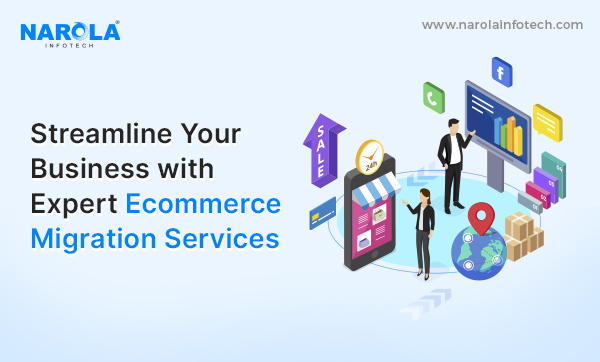Are you looking to take
your online business to the next level? Whether you're aiming to switch to a
more robust platform, optimize your current setup, or simply streamline
operations, ecommerce migration could be the game-changer you need. At Narola
Infotech, we specialize in seamless ecommerce platform migration services designed to enhance your online presence and
boost your bottom line.
Why Choose Ecommerce Migration?
Our Ecommerce Migration Services
Get Started Today
Ready
to elevate your ecommerce business with expert migration services? Visit our Ecommerce Migration Services to
learn more about our offerings and how we can help you achieve your ecommerce
goals. Contact us today to schedule a consultation and take the first step
toward a seamless and successful migration journey.
Why Choose Ecommerce Migration?
In today's dynamic digital
landscape, staying ahead of the competition requires agility and adaptability.
Here are some compelling reasons to consider ecommerce migration:
- Enhanced Performance: Upgrade to a high-performance ecommerce platform that can handle increased traffic, transactions, and
data volume without compromising speed or user experience.
- Scalability:
Future-proof your business by migrating to a scalable platform that can
grow with your business needs, whether you're expanding your product
catalog, targeting new markets, or implementing advanced features.
- Improved Security: Protect your customers' sensitive data and build trust with robust
security features offered by modern ecommerce platforms, including secure payment gateways, data encryption, and compliance with industry standards.
- Seamless Integration: Integrate third-party tools, plugins, and applications seamlessly
to enhance functionality, automate processes, and provide a seamless
shopping experience across channels.
- Optimized SEO:
Leverage advanced SEO capabilities to improve visibility, drive organic
traffic, and increase conversions through optimized product pages,
structured data, and mobile-friendly design.
Our Ecommerce Migration Services
At Narola
Infotech, we understand that every
business is unique, which is why we offer tailored ecommerce migration services
to meet your specific goals and requirements. Our comprehensive services
include:
- Platform Assessment: We assess your current ecommerce platform, identify pain points,
and recommend the most suitable platform based on your business
objectives, budget, and technical capabilities.
- Data Migration: Our
experts ensure a smooth transition of your product data, customer
information, orders, and other critical data to the new platform,
minimizing downtime and data loss.
- Customization and Development: We customize the new platform to align with your brand
identity, design responsive and user-friendly interfaces, and develop
custom features and functionalities to enhance the shopping experience.
- Testing and Quality Assurance: We conduct rigorous testing across devices and browsers
to ensure compatibility, functionality, and performance, addressing any
issues before launch to deliver a flawless user experience.
- Post-Migration Support: Our support doesn't end at migration. We provide
ongoing maintenance, updates, and technical support to ensure your
ecommerce platform remains secure, optimized, and competitive in the long
run.

Comments
Post a Comment